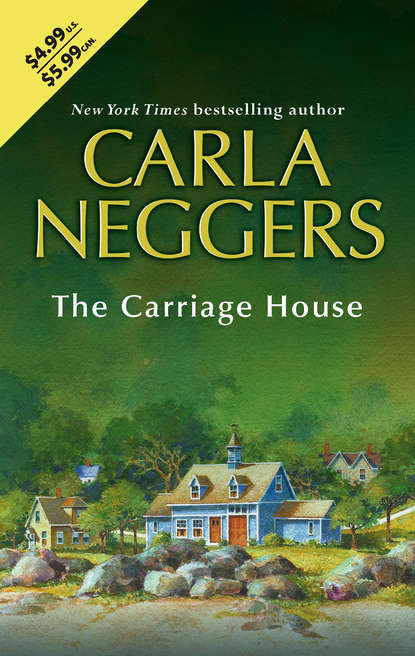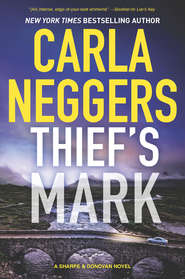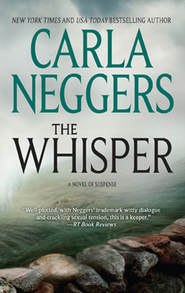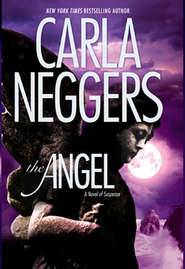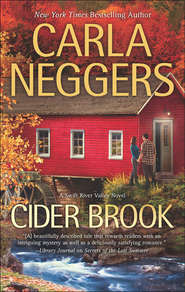По всем вопросам обращайтесь на: info@litportal.ru
(©) 2003-2024.
✖
The Carriage House
Автор
Год написания книги
2018
Настройки чтения
Размер шрифта
Высота строк
Поля
“It’s not. I’m Tess Haviland. I own the carriage house.”
Surprise flickered in his very blue eyes. “I see. Well, I’m Andrew Thorne. I own the house next door.”
“Thorne?”
“That’s right. Jedidiah was my grandfather’s grandfather. Enjoy.”
He retreated along the lilacs, not going through the middle of them the way his daughter had.
A Thorne. He’d obviously liked telling Tess that. Damn Ike. He could have warned her. But that wasn’t his style, any more than telling people he was off to climb mountains, explore rivers, sleep in a hammock on a faraway beach. He was a man who lived life on his own terms, and that, Tess supposed, was why, ultimately, she liked him.
But she’d rather he’d told her the neighbors were related to her ghost.
Using one of the keys in the envelope Lauren Montague had given her, Tess entered the carriage house through the side door, which led directly into a circa 1972 kitchen, complete with avocado-colored appliances. She hoped they worked. She could do fun things with an avocado stove and fridge.
She stopped herself. What was she thinking? She couldn’t afford to keep this place. She’d have to scrape to pay the tax bill, much less find any money for basic repairs and upkeep. The utilities bills must still have been sent to the Beacon Historic Project—she hadn’t seen an electric or a fuel bill. She’d have to straighten that out with Lauren Montague, whether she sold the carriage house or kept it.
This was exactly why she’d dithered for a year, Tess thought. She simply didn’t have the time or the money to deal with a nineteenth-century carriage house. Susanna was right. She should have insisted on cash.
She checked out the kitchen. Solid cabinets, worn counters, stained linoleum floor. Little mouse droppings. The fridge was unplugged. She rooted around behind it and managed to plug it in, smiling when she heard it start to hum. She checked the burners on the stove. They all worked. So far, no sign of Andrew Thorne’s grandfather’s grandfather, the infamous Jedidiah Thorne who’d killed a man here, even if it was over a hundred years ago. Tess shuddered.
There was a full bathroom off a short hallway on the same end of the house as the kitchen. She wondered when the building had been converted from housing horses and buggies to people—sometime in the past century-plus, obviously. She peered up a steep, narrow staircase, shadows shifting at the top of it.
“That’s a little eerie,” she said aloud, then realized she was standing on a trapdoor. She jumped back, her heart pounding. What if she’d fallen through? Balancing herself with one hand on the hall wall, she stomped on the trapdoor with her right foot. It seemed solid enough.
Emboldened, she knelt in front of it, pushed the wooden latch and lifted it. It was solid wood, heavier than she’d expected, every crack and crevice filled with dust and dirt. She wasn’t surprised to find there was no ladder, just a dark, gaping hole to whatever was below—furnace, pipes, spiders.
Then she realized there was a ladder, after all, hooked to the cellar ceiling, under the hall floor. She’d have to reach in through the opening, unhook it and lower it to the cellar floor. Then, presumably, climb down.
“No way.”
Tess shut the trapdoor and latched it. She’d do the cellar another time. Hadn’t Lauren mentioned a bulkhead? Good, she’d go in that way. If she bothered at all.
She resumed her tour, still smelling the dirt, dust and musty smells of the old cellar. She’d lived in older houses her entire life. They were no big deal to her, except they’d always been in the city—never out here on the edge of the Atlantic Ocean.
“The carriage house has tremendous potential,” Ike had said. “I can feel it when I walk through it. It’s one of my favorite structures. Unfortunately, it’s rather new for us.”
She smiled, thinking of what a contradiction he was. Scion of a New England industrial family, mountain climber, America’s Cup contender, tennis player, white-water kayaker, womanizer…and lover of old houses. Conventional wisdom had him off in the Australian Outback, or Southeast Asia or Central Africa. Sometimes Tess wondered if he weren’t hiding in Gloucester, watching them all.
Surely someone had to know where he was. An open, double doorway led from the kitchen to a long, narrow room with wide-board pine floors, attractive paned windows, a stone fireplace and the front door, probably half the size of the original carriage-width doors. As Lauren had warned, there was no outside lock, just a dead bolt latched from inside. One of the many things to be corrected, Tess thought as she stepped into the middle of the room, imagining color and fabric, music and laughter, friends, children. Dangerous imaginings. She really had no business hanging on to this place for as long as she had.
Her gaze fell on a deep, dark stain on the wooden floor just inside the front door. She walked over slowly, ran her toe over it. It could pass for blood. For all she knew, it was blood.
A man had died here, she remembered. Benjamin Morse, the rich wife-beater, defending his honor. Did a wife-beater have honor? Not in her book. But perhaps he was innocent. Had Jedidiah Thorne been the kind of man to make such a charge recklessly, without proof? Or perhaps he’d done so as an excuse to kill Morse, whom he would have known would challenge him to a duel? Maybe Jedidiah had been in love with Adelaide Morse.
Tess had no answers. There were two small rooms at the other end of the house that immediately presented possibilities. Tess pictured domestic things like sewing machines, library shelves, overstuffed chairs, hooked rugs—and herself, working here. She could create a design studio upstairs, put in skylights and state-of-the-art equipment, work overlooking the sea instead of an historic graveyard. The designer and the ghost of Jedidiah Thorne.
She was getting ahead of herself, and she knew it. She returned to the main room and stood very still, listening for ghost sounds.
Nothing, not even Princess Dolly’s missing cat. “Ridiculous,” Tess muttered, and headed back out to her car.
As soon as he reacquainted Dolly with the rules of the house, Andrew grabbed two beers and sat out with Harl in the old Adirondack chairs under the shagbark hickory. It was a big, old, beautiful tree, probably planted by Jedidiah Thorne himself, before he took to dueling.
“Where’s Dolly?” Harl asked.
“Sulking in her tree house.” It was six rungs up into a nearby oak, and she’d helped Harl build it out of scrap lumber. Andrew, an architect, had stayed out of it. Some things were best left to Dolly and Harl. But not all. “She thinks if she didn’t go out into the street, she didn’t really leave the yard.”
“She’s going to be a lawyer or a politician. Mark my words.”
Andrew gritted his teeth. “It’s that damn cat.”
“I know it. If it wouldn’t break Dolly’s heart, I’d wish Tippy Tail would sneak off and find herself a couple of new suckers to take her in. She’s a mean bitch. Clawed me this morning.” He displayed a tattooed forearm with a three-inch claw mark, then opened his beer. “I should’ve taken her to the pound.”
But Andrew knew that wouldn’t have been Harl’s way. He was a soft touch with children and helpless animals. Tippy Tail was scrawny, temperamental and pregnant, but once Dolly saw her, that was that. Harl had seen and committed more violence than most, first growing up in a tough neighborhood in Gloucester, then in war, finally in his work as a detective. Yet, he was also the gentlest man Andrew had ever known. His first and only marriage hadn’t worked, but his two grown daughters adored him, never blaming him for retreating to his shop, working on furniture, staying away from people.
Sometimes Andrew wondered if Joanna would have approved of Harley Beckett taking care of their daughter. But not tonight. Tonight, Andrew accepted that his wife had been dead for three years, killed in an avalanche on Mount McKinley. She’d only started mountain-climbing the year before, when Dolly was two. Ike Grantham’s idea.
“He makes me want to push myself,” she’d said. “He makes me want to try something out of my comfort zone. Leaving you here, leaving Dolly—it scares the hell out of me. And excites me at the same time. I have to do this, Andrew. I’ll be a better person because of this experience. A better mother.”
Maybe, Andrew thought. If she’d lived. But climbing mountains, even in northern New England, had made Joanna happy, eased some of the restlessness and desperation that had gripped her with Dolly’s birth. She hadn’t been ready for a child. He could see that now. She’d felt, in ways he couldn’t understand, that she’d lost herself, needed something that was hers, that felt daring and not, as she’d put it, “tied down.” She hadn’t meant Dolly in particular. She’d meant everything.
“I love Dolly with all my heart,” she’d tried to explain. “And I love you, Andrew, and my job.” She was a research analyst with the North Atlantic Strategic Studies Institute. “I’m not dissatisfied with anything on the outside, just on the inside.”
Ike Grantham seemed to understand. Or pretended to. Andrew wasn’t any good at pretending.
“Ike and I aren’t having an affair, Andrew. Please don’t ever think such a thing.”
Andrew had believed her. Whatever would have become of their marriage if Joanna had come home from Mount McKinley no longer mattered. She hadn’t, and he’d had to go on without her. So had Dolly. He didn’t blame Ike for Joanna’s death—that would have meant robbing her of her independence, and perhaps even denying her her love of climbing.
He drank some of his beer and listened to the birds in the hickory. Winter had finally let go of the northern coast of Massachusetts. “So, Harl, who the hell is Tess Haviland?”
“No idea. Why?”
“She says she owns the carriage house.”
Harl frowned. “Lauren sold it?”
“I don’t think so. Not recently. We’d have heard.”
“Ike.”
It was possible. Andrew said nothing, picturing Tess Haviland in front of the lilacs. Blond, athletic build, attractive. Pale blue eyes, and a touch of irreverence in her smile and manner. It was difficult to say if she was Ike Grantham’s type. Most women were.
Harl grunted. “All we need is that bastard resurfacing. Things have been quiet this past year.” He settled back in his chair and stared up at the sky. “I like quiet.”
“I’ll find out what the story is. Ike might not have anything to do with this Haviland woman.”
But he knew Harl was dubious, and Andrew admitted he had his own doubts. When most of Jedidiah Thorne’s original property had come onto the market not long after Joanna’s death, Andrew bought it. He’d tried to buy the carriage house as well, but Ike had refused to sell. Not that Andrew had wanted it particularly, given its sordid history, but it seemed odd to have it separated out from the rest of the property—and it meant he had no control over who might end up on the other side of the lilacs.





